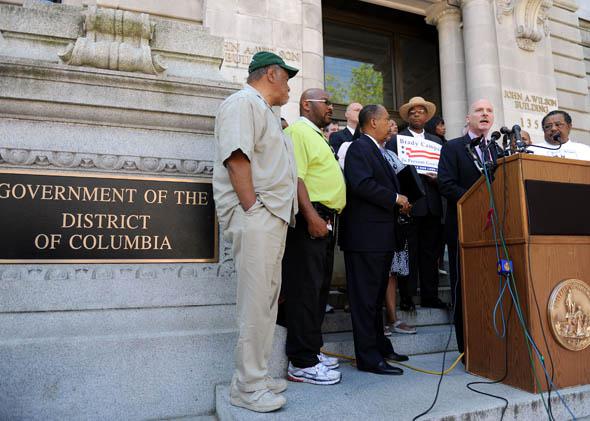Smoking something illegal in D.C. carries a sort of resonance, a sort of poetry, that you don’t get in the suburbs. In 1989, as the crack wars raged, the DEA ran a sting in front of the White House just so the president could wave a bag of it on TV— “as innocent looking as candy.” A few months later, three-term Mayor Marion Barry was caught smoking crack by an FBI camera, temporarily shaming him out of politics. Even now, if you live in D.C. long enough you’re likely to be contacted by the feds and asked if someone you know, someone working through a background check to secure a government job, has done anything to be ashamed about.
But if you’re white and live in one of D.C.’s decent neighborhoods, the drug laws are nothing to worry about. I learned that again over the weekend, when I wound up at a party in the Mount Pleasant neighborhood—as gentrified as it sounds—and smoked some pot in a backyard with a few friends. After a few more-hilarious-than-usual conversations, I walked home, taking in the parfum of a Schedule 1 substance from a few more backyards and porches.
Nobody that night seemed very worried about the law. Nor should they have been. In D.C., black people and white people are just as likely to smoke pot. Black people are at least eight times more likely to be arrested for it. That’s untenable, especially in a culturally liberal city that votes roughly 19-1 for Democratic presidential candidates
And that’s why the D.C. council is trying to reduce marijuana to a parking ticket-level offense: $25 if you’re caught with less an than ounce, $100 if you’re smoking outside. Selling and growing would stay illegal, but the smokers wouldn’t be collared anymore. At a brief, 16-minute public meeting today, five members of the judiciary committee voted to advance the Marijuana Possession Decriminalization Amendment Act of 2014. Three of them—Tommy Wells, Jack Evans, and Muriel Bowser—are currently running for mayor.
Twenty-four years after Marion Barry humiliated himself with a crack pipe, three possible successors were jostling to be the most pro-pot candidate. There will be no anti-pot candidate. The decriminalization bill, endorsed by 10 of 13 council members, will probably be law by the spring. And Barry himself co-wrote it.
“The only pushback or pressure,” said Wells after the vote, “has been about why don’t we just go ahead and legalize, why don’t we just tax and regulate. The problem is that might cause Congress to step in. This is such an issue of social justice that I don’t want to slow this part down. I’m afraid that would get jammed up. I want to get this out of the way, address the social justice issue. Then we can have a conversation about legalization.”
Wells mentioned “social justice” a few more times, totally forthright about the challenge of winning a mayoral primary as a white guy. A nearby radio reporter who knew Wells ribbed him about winning “the 2 percent of the black vote” that was gettable. Incumbent Mayor Vincent Gray, like every mayor of D.C. since home rule began, is black. Wells and the other council members were riding a wave, to “put racial justice at the heart of the legalization movement,” as Nation editor Katrina Vanden Heuvel said last week on MSNBC.
Congress—that was less fun to talk about. Congress could, theoretically, undo this law and protect the area around its offices from creeping Vancouver-ization.
But why would it? To block decriminalization, Congress could use its mandatory 30-day review period to pass a resolution disapproving of the law. I asked a bunch of Republican flacks, most of them on the relevant oversight or judiciary committees, whether they’d try this. The response was either “no comment” or no awareness of the bill.
Decriminalization campaigners aren’t expecting that to change. “There’s just not the will at this point to stop D.C. from doing this,” suggested Dan Riffle, director of federal policies at the Marijuana Policy Project. “Even the old reliable opponents, the Chuck Grassleys of the world, have stopped talking about it. The more likely threat to the bill would be a rider, one of hundreds of lines slipped into a must-pass bill.”
That’s another case study in how the politics have changed. In 1998, before D.C. voters approved a medical marijuana initiative, the Republican-controlled Congress thwarted it with an amendment to a spending bill. No federal funds or local could be used to implement the initiative. It took 11 years for Congress to rewrite that language, barring only the federal funds, less of a problem in the city’s boom years. Washington was free to legalize dispensaries, which it did, under incredibly strict conditions that saw only 111 people making use of the service last year.
Medical marijuana isn’t much of a “social justice” issue. Decriminalization is. At the judiciary hearing on Wednesday, chairman Wells praised the new bill for possibly “ending the disenfranchisement of a significant section of our city.” The only quasi-disagreement came when Bowser (who’s black) asked the council to think about the next steps, about legalization.
“I want to know, if it’s not a crime to possess it, where then are people buying it?” she asked. “How are we going to deal with that? Certainly, we don’t want to go back to the days when we had open-air drug selling in our city. The logic of legalization makes more sense to me than decriminalization… regulating how people can procure this now-decriminalized marijuana has to be, I think, the second step.”
That was it; that was the debate. The bill passed on a voice vote, on to the full city council, in a city that used to panic about drugs.
“Let the record show it was unanimous,” said Wells.
